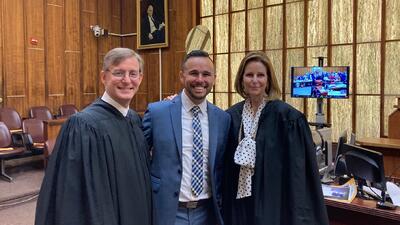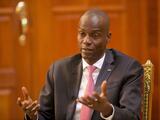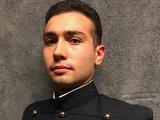Redemption story: one man's legal journey from behind prison bars to being admitted to the bar

If things had gone the way they were originally intended, Angel Sanchez would still be in jail, with a release date in 2028.
Instead, Sanchez, aged 40, was sworn in Friday to the Washington DC Bar which oversees all professional lawyers practicing in the nation’s capital.
The emotional ceremony in Miami’s state courthouse, surrounded by lawyers and judges, capped off a remarkable rise from a life of street crime to the warm embrace of his legal colleagues.
“ We hand out a lot of punishment in this courthouse. We don't get a lot of happy days. So today is a joyous, joyous day,” said Florida Circuit Judge Miguel e la O in brief remarks before swearing in Sanchez.
“We hand out these punishments. We hope they're going to change the trajectory of people's lives. And it's so easy to say that the punishment that Angel was given changed the trajectory of his life. But if we're honest with ourselves, he's not here because he went to prison. He's here in spite of the fact that he went to prison,” he added.
Choking back tears, Sanchez thanked many of those who had mentored him over the years, including de la O who offered him a guest room in his house when he learned that his intern was homeless and sleeping in his car.
“Some of us are called to do the impossible. I never thought this day would come,” said Sanchez, who recalled discovering his love for the law aged 19, after already three years behind bars. He was inspired to study after reading a 1978 case of a former inmate who became a lawyer. “That’s the power of having role models,” he said, adding that he hoped others would now be inspired by his story.
“I think it shows that if the criminal justice system is going to be a justice system, we have to be sure that those being punished have the opportunity to be restored,” he said.
Angel Sanchez back in court, but in very different circumstances
Only a few years ago, the Richard E. Gerstein justice building was a place Sanchez knew all too well, for all the wrong reasons. Arrested multiple times, he was in and out of state court as a juvenile, before being arrested aged 16 after a gang altercation in Miami and sentenced to 30 years in prison for attempted murder with a firearm.
The Washington DC Bar last week certified Sanchez for admission after he passed the tough legal exam. As a mark of the enormous respect he has earned from his peers, the Washington DC Bar waived what is known as a “’character and fitness” hearing, usually required for candidates with criminal record.
And as a further honor, he was invited to be sworn in by Judge de la O for whom Sanchez clerked while studying at the University of Miami law school. (A federal judge in any state can swear in someone to the Washington DC bar). Sanchez described how De la O offered him a room in his house when he learned that he was homeless and sleeping in his car.
Angel Sanchez: “A brilliant young lawyer”
Also attending was federal judge Kathleen Williams who described Sanchez as “a brilliant young lawyer” whose admission to the bar was “the extraordinary achievement of an extraordinary person.” She said she hoped that one day soon Sanchez, a Miami native and the son of Cuban and Venezuelan parents, would be admitted to the Florida bar.
Under Florida law Sanchez cannot practice in the state as convicted criminals are not allowed to take the Florida bar exam unless they have had their civil rights fully restored, one of the few in the country with this requirement. Under Florida law, convicted felons must apply to a state Clemency Board to have their rights restored, including the right to sit on a jury or stand for public office.
Sanchez applied for civil rights restoration several years ago and is waiting for his case to be reviewed. Along with many former felons in Florida his voting rights were restored in 2018 thanks to a constitutional amendment.
Washington DC is one of several jurisdictions whose bar exam he was eligible to take and which transfers scores to many other states. He moved to Washington earlier this year to work for the Department of Justice under a ‘Second Chance’ fellowship for formerly inmates to provide expert advice on criminal justice reform.
Making the occasion more special, Friday was the birthday of Sanchez’ late father.
Sánchez credits his parents with pushing him to get an education behind bars. His Venezuelan-born mother, Dexis Montiel, sent him books to study and his Cuban-born father, Enrique Sanchez, proudly kept a copy of his paralegal certificate obtained while still in prison through correspondence courses. While in prison he created a handbook for i
nmates about how to further their education.
Sadly, his father died a year before his son was released. His mother attended Friday’s ceremony with Sanchez’s sister and two nephews. “I knew that he was going to do great things. I was very supportive. Now he's achieved this and I give thanks to God," she said.
"The quintessential Miami redemption story"
After serving 12 years in jail, Sanchez was released in 2011 when he successfully appealed his case after discovering he had been unjustly sentenced as an adult.
“I came out of prison and I decided I want to go to school and I'm going to do what it takes,” he said. He continued his studies in a homeless shelter earning respect – and scholarships - along the way and graduating in 2020 among the top 10% of his class at the University of Miami.
“Angel is the quintessential Miami redemption story,” said Carlos Martinez, head of the Miami-Dade County Public Defender’s office which provides legal representation to defendants who can’t afford a lawyer. “He's exceeded all expectations that anyone had of him. He's someone that we all look to as a beacon, an example of what can happen when you give people the opportunity to succeed,” he added.
When Sánchez left prison, aged 28, he wrote an essay for a college course in which he credited his will to succeed to the compassion from mentors. “Willingness to make it is only half the story - without the compassionate helping hand of those in a position to help, all the sacrifice in the world would be meaningless. It is when ‘will’ meets ‘compassion’ that success is truly inevitable," he wrote.
He graduated from Valencia College in Orlando in 2014 while still living in a homeless shelter. He went on to obtain two degrees at the University of Central Florida before entering law school.
He graduated from the University of Miami law school among the top 10 percent of students. He clerked with judge Williams while writing a paper for the Harvard Law Review on the prison abolition movement which seeks to reduce or eliminate prisons by relying more on rehabilitation programs.
What changed in the life of Angel Sanchez?
Interviewed by Univision in 2018 while at the University of Miami he compared his life as a gang member with law school. "I look at myself and I ask how much of me has really changed," he said, explaining that he had always sought the respect of his peers, whether it was other gang members or legal colleagues. The difference now was that he had learned how the channel that desire in a positive direction.
“Coming from a broken home where there was little reason for someone to care and respect me - my mom battled drug addiction and my dad was generations older than me, always working - I never had any other way of earning that. So, I looked for the ways to earn it and unfortunately in the '90s there was a lot of guns and violence so those were the things that I was doing, and in return I was actually getting love and respect," he said.
He has twice been invited to speak at Harvard University’s Department of Philosophy on a panel about the challenges ex-felons face on re-entering society without their full civil rights being restored.
After leaving prison he joined the Florida Rights Restoration Coalition (FRRC) which campaigned successfully in 2018 for an amendment to restore voting rights to Florida felons after they leave prison.
Desmond Meade, the founder of FRRC, who flew from New York to attend the swearing in, described how he relied on Sanchez’s legal advice when he was asked to sit on a national task force with two former attorney generals, Loretta Lynch, and Alberto Gonzales. “It was basically all Angel’s ideas and critical thinking that went into their final report. It has Angel’s DNA is all over that,” he said.
“Angel just shows how there's so much potential, even in the people who may make mistakes or commit crimes. We just have to understand their value as human beings,” he added.



